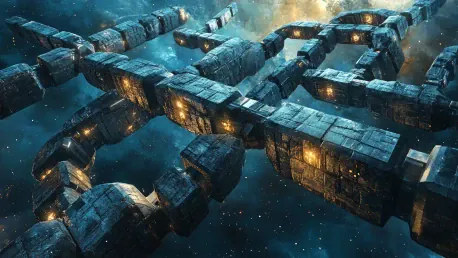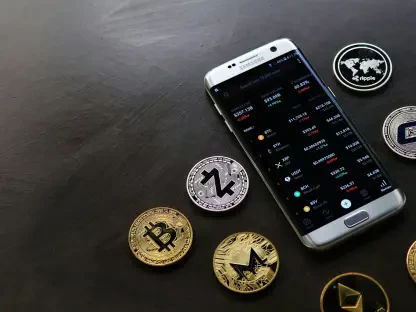As the gaming industry continually evolves, Artificial Intelligence (AI) and blockchain technologies are poised to drive a major transformation in the way players experience games. Traditional gaming paradigms are on the cusp of a revolutionary change, propelled by the convergence of these two cutting-edge technologies, which are set to redefine the future of gaming.
AI-Driven Enhancements
Predictive and Personalization Capabilities
Artificial Intelligence has made significant strides in enhancing gaming realism, offering players an experience once thought to be part of the distant future. The predictive and personalization capabilities of AI can now analyze players’ behaviors, preferences, and strategies to create tailored gaming experiences. This means that games can adapt in real-time to the individual player, providing challenges that are neither too hard nor too easy, but just right for each person’s skill level. This personalized approach not only makes games more engaging but also prolongs their lifespan by maintaining player interest over time.
Moreover, AI’s ability to generate unique on-chain assets has pushed the boundaries of what was previously possible in gaming. With this technology, in-game items and characters are no longer confined to static, predefined roles or designs. Instead, they become distinct, evolving entities that can change and grow along with the player’s journey. This dynamic generation of assets adds a layer of depth and complexity to games, making every player’s experience unique. By fostering an environment where in-game items can evolve, AI contributes to a richer gaming ecosystem that maintains players’ interest and keeps them returning for more.
Adaptive Gameplay and Enhanced NPCs
Beyond personalization, AI brings unprecedented adaptability to gameplay, dynamically adjusting challenges based on player strategies. This ensures that both novices and seasoned gamers encounter obstacles that are appropriate to their abilities, enhancing the overall gaming experience. For beginners, AI creates a supportive environment that helps them build confidence and improve their skills, while more experienced players face sophisticated challenges that keep them engaged and tested. This adaptive quality of AI signifies a shift from static game design to a more fluid and responsive interaction that keeps players invested.
AI also revolutionizes the behavior of non-player characters (NPCs), making them more lifelike and responsive. Traditional NPCs often follow predictable patterns, but AI infuses them with real-world unpredictability and consciousness. This means NPCs can now react to a player’s actions in more nuanced ways, creating a dynamic and immersive environment that feels alive. Whether it’s a rival character that learns and adapts to the player’s tactics or allies that offer more realistic assistance, AI-powered NPCs significantly enhance the depth and immersion of gaming worlds. This evolution in NPC behavior not only enriches the narrative but also adds a layer of unpredictability that enhances replayability.
Blockchain and Decentralization
True Ownership of In-Game Assets
Blockchain technology, particularly as seen in the advent of Web 3.0, introduces a decentralized paradigm that fundamentally shifts the power dynamics within gaming. One of the most significant changes is the concept of true ownership of in-game assets. In traditional gaming, items and achievements earned by players are often confined to the game’s servers and subject to the company’s policies. However, blockchain technology empowers players to truly own their in-game assets, independent of any centralized control. This shift means that once a player acquires an item or achieves a milestone, it is theirs to keep, trade, or sell as they see fit.
The decentralization fostered by blockchain technology also enables the creation of player-driven economies. Players can now participate in a broader digital economy where their skills, time, and investments are rewarded with real-world value. This transformation turns in-game achievements into assets that can be exchanged or sold outside the game’s ecosystem, providing tangible benefits. The transparency and security inherent in blockchain systems ensure that these transactions are trustworthy and verifiable, reducing the likelihood of fraud and enhancing player confidence. This shift to a decentralized model empowers players and fosters a more equitable gaming environment.
Trust, Transparency, and Economic Empowerment
The introduction of blockchain into the gaming world goes beyond merely offering true ownership of assets. It brings with it a level of trust and transparency previously unseen in the industry. Every transaction and change in ownership is recorded on a public ledger, accessible to all participants. This openness ensures that players can independently verify the authenticity and provenance of in-game items, reducing the potential for scams and counterfeit assets. Trust is further bolstered by the immutable nature of blockchain records, ensuring that once information is recorded, it cannot be altered or tampered with.
Moreover, blockchain technology opens up new possibilities for leveraging skills and assets in innovative ways. Players can use their gaming achievements as collateral for loans or other financial services, bridging the gap between virtual and real-world economies. This economic empowerment is a game-changer, as it allows players to benefit financially from the time and effort invested in their gaming pursuits. By transforming in-game assets into valuable economic tools, blockchain technology is revolutionizing not just gaming, but the broader digital economy as well.
The Future of Gaming
Player-Driven Experiences
The convergence of AI and blockchain technology signifies a significant departure from traditional gaming narratives to more flexible, player-driven experiences. This integration promises a future where games are not merely about following predefined paths but about creating one’s destiny. Players will be able to shape their gaming journeys in ways previously unimaginable, making each experience unique and personalized. This player-centric approach ensures that games remain engaging and relevant, as they continuously evolve based on players’ decisions and actions.
Such a transformation is poised to redefine the gaming landscape, making it more immersive and dynamic. The combination of AI’s adaptive gameplay and blockchain’s decentralized structures creates an environment where players have unprecedented control and influence. This shift towards a more inclusive and engaging gaming experience is set to attract a wider audience, including those who may have previously felt alienated by traditional gaming models. The future of gaming is one where creativity, collaboration, and adaptability take center stage, offering a richer and more diverse array of experiences.
Challenges and Opportunities Ahead
As the gaming industry constantly evolves, Artificial Intelligence (AI) and blockchain technologies are set to lead significant changes in how players experience games. The introduction of AI in gaming promises smarter, more adaptive gameplay, creating an environment that reacts to the player’s actions in real time. On the other hand, blockchain technology introduces a new level of security and transparency, allowing for verifiable ownership of virtual assets and fostering trust among players.
Traditional gaming paradigms are on the verge of a groundbreaking transformation, driven by the merging of these two advanced technologies, which are expected to redefine the future of gaming. Players will likely enjoy more personalized, immersive experiences through AI’s advanced capabilities, while blockchain provides new ways to manage in-game economies and assets. This convergence signifies a shift where games are not just forms of entertainment but also platforms for social interaction and even economic activities. The future of gaming looks promising as these technologies continue to develop, offering possibilities that were once just science fiction.









